Kategorie: ‘Applied Geophysics’
My Internship in Paris
- Applied Geophysics M. Sc.
- France, Paris/ Clamart
- SLB Ribout Product Center
- 03/2024 – 08/2024
Application & Finding an internship
The Joint MSc Applied Geophysics is a two-year, joint degree masters offered by TU Delft in the Netherlands, ETH Zurich in Switerland and RWTH Aachen in Germany. Being a student in this unique programme, I had the incredible opportunity to spend a semester in each of the three countries to experience their diverse, yet suprisingly resembling cultures. As part of the graduation requirements, we are required to conduct full-time research in the final semester, with a list of topics provided by the three universities to choose from.
Interestingly enough, there are also external opportunities outside of the three aforementioned universities. In collaboration with one of the programme‘s universities, previous students have worked at research institutes in Norway, companies in Canada, and more. For our cohort this year (2024), there is an internship position from SLB (formerly Schlumberger) in Paris, France. However, we have to compete with students from other universities outside of the programme for this position.
To apply for the internship, I was required to submitted my CV, MSc transcript, and a motivation letter by November 2023. Fortunately, after just one round of interview, I was selected among more than four applicants to work at this prestigious oil and gas company starting from March 2024 for half a year! I must admit, I do feel slightly privileged to have received this internship opportunity, partly thanks to my MSc programme. Therefore I highly recommend that you start your search for an internship early—9 to 12 months before the start date should give you enough time for any administrative and visa applications that might follow. All the best!
Accomodation & Living expenses
Just like finding an internship, it’s best to start early when searching for a room or studio in Île-de-France once your internship is confirmed. Besides the influx of tourists, this bustling metropolis is home to numerous universities, making student housing short in supply.
When choosing a place to live, it’s wise to pick a location with night transport (Noctilien), ideally within Zone 3 of the IDFM transport network. Trust me, you don’t want to end up like me—trying to save money by living in a remote area for 575€/mo (17m2) with no late-night buses, only to find yourself increasingly relying on Uber to get home as your local social life takes off and the parties become more frequent…
To start with, Cite Universitaire (not a university, but a student housing cluster) is a great option for finding a room. Located at the edge of the city of Paris, it offers excellent all-day transport links and, best of all, an exciting student life if you’ve chosen to be an extrovert:: https://www.ciup.fr/en/
Another option is Twenty Campus, a private housing company geared towards university students, with SOME and only SOME of their residences conveniently located for all-day access to Paris: https://www.twenty-campus.com/en/map/
Remember to check reviews on Google or other platforms before selecting a residence!
Besides, the French government offers housing assistance to students living in France through the CAF scheme, which you can apply for after your first month of residence. You can learn more about it here: https://www.feelfrancais.com/apply-for-the-caf/
As for transport, you’re in luck! The IDFM network offers a student annual pass called the “ImagineR,” which costs €375 a year and is valid throughout Île-de-France, covering Zones 1 to 5 all year round. You’ll need your RWTH enrollment certificate and your internship certificate to apply. Learn more about the scheme and save a LOT of money here: https://www.iledefrance-mobilites.fr/imagine-r
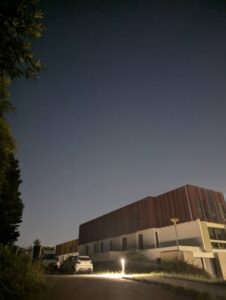
My place is tranquil, but it’s just horribly far away from everything. ©Tin Long Ryan Ko
(Best of all, since you are working as an intern in France, your company is required to reimburse a portion of your transport ticket cost. This means you might end up paying less than half the price of the pass!)
Other expenses in France are quite comparable to that of Germany. Eating out might cost a bit more (at around €20), but trust me, the quality of French cuisine and their hospitality is absolutely worth the extra penny. And if you’re a young museum enthusiast, there’s even better news—most French museums are free for students from EU universities. If you have some free time off work, don’t miss the chance to enrich your cultural knowledge and catch up with the Frenchies!
Digital payment is very common in France, so you can definitely get by without cash for long – unlike in Germany. Here’s a breakdown of my average monthly expenses in Euros:
- Accommodation 575 €
- Food (and groceries) 250 €
- Insurance 70 €
- Travelling/ Misc. 230 €
…bringing my total to around 1150 € per month for everything. Pas mal !
Everyday life/ the internship
While I can’t share the technical details of my internship, a typical workday generally goes like this if I’m not teleworking: It takes me 45 minutes to get from my residence to the office (thanks to my less-than-ideal location), arriving around 10:30 am. I code for a bit, then enjoy lunchtime with my fellow interns from 12:30 pm to 2:00 pm. After that, there’s more coding and occasionally some meetings in the afternoon. I usually leave the office by 5:30 pm at the latest. Although I work 35 hours a week, I’m allowed to telework about two days a week on average. So, the work is pretty flexible, as my supervisor put it: “Just finish the work on time, and you’ll be fine. Don’t let me know where you work.”

Looks chill, but definitely not inside. ©Tin Long Ryan Ko
Are the French chill at work? I guess it depends on the workplace. Since SLB is a global company, some colleagues do end up having to be available at 3:00 am for meetings with American and East Asian headquarters. While my colleagues aren’t too surprised to receive Teams messages outside of official work hours, I have to admit, this did shatter my fantasy of the laid-back French workplace… Hierarchies were flat, though, so there is nothing to worry in this regard.
Don’t take my everyday life in Île-de-France as a reference, though, since the city was in full swing preparing for the 2024 Olympic Games (Jeux Olympiques) while I was enjoying the higher-than-normal living standards in the metropolitan area. Transport was smooth, stations didn’t smell like human excrement, and everyone was surprisingly willing to (try to) speak English rather than French. There was abundant security and police patrolling the streets… All my friends who have lived in Paris for a long time say this was just a dream, and I’ll definitely experience the renowned Paris syndrome the next time I visit.
Anyway, whenever the weather is nice, I like to head into the city, stroll around, visit some museums, take pictures for memories, and indulge in some of the best pastries in the world. I also meet up (or party) with my friends every week or two, eventually causing myself to order an Uber more and more, though it’s definitely worth it.
And if you want to add a touch of romance to your time in Paris, play some songs by Laufey, or any bossa nova in your earphones – it’s an absolute sensation.

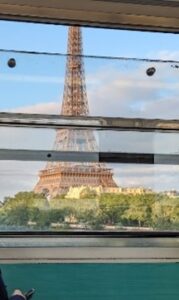

Come on, at least travel to these three places if you are in Paris. ©Tin Long Ryan Ko
Free time/ tips
“If you are lucky enough to have lived in Paris as a young man, then wherever you go for the rest of your life, it stays with you, for Paris is a moveable feast.” ― Ernest Hemingway, A Moveable Feast
C’est vrai.
But what did Hemingway mean by ‚movable feast‘, though? I suppose it differs from one to another person. It can be your romantic life, a galore of museums, endless pub crawls, or just simply the scrumptious food that Paris has to offer. I can’t personalize any solid advice to you reading this now, but do make the most of your time in Paris. Don‘t just stay at home working – that you have done plenty already in Aachen.
I hope the tips and links I’ve written above are practical and helpful. If not, here are some additional general tips that I‘ve brainstormed:
- Moving from A to B within Paris (zone 1 – 2) usually takes 30 minutes, while travelling to/from outside Paris can take about an hour. (Again, try to find a place to live within zone 3!)
- Purchasing pastries from supermarkets, especially baguettes, is a crime.
- There’s no such thing as bad weather, just bad clothing.
- Tap water is LEGALLY free in Parisian restaurants.
- Always be a bit more cautious of your valuables.
- Generally, districts south of the Seine and to the (south-)west of the city are safer.
- Learn some French from Duolingo or any similar apps before you arrive. Definitely useful when you take an Uber or venturing outside of Paris…
- Use both IDFM app AND Citymapper to traverse around the metropolitan.
And as a final tip: travel more! You can earn your expenses back when you start working, but you might well only be in Paris/ France once in your lifetime. France has so much to offer – from the snowy Alpine resorts to the relaxing French riverera, from the historic Normadie to the unique Basque country, you’ll need to visit France 1000 times to truly grasp what the hexagon is all about. The same goes for Paris, that she is both modern and historical, elegant and filthy, refreshing and gothic.
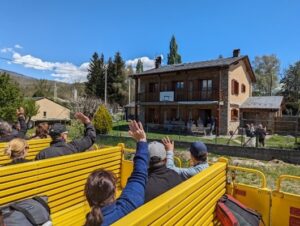
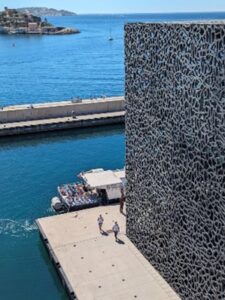

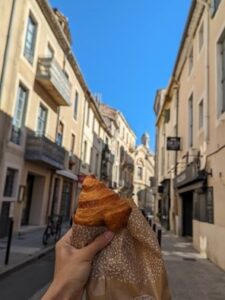
©Tin Long Ryan Ko
Conclusion
Do I have Paris syndrome?
Perhaps I caught the opposite syndrome – I didn’t think I’d enjoy Paris, only to find her seductive allure lingering in my mind now that I’m writing this.
Paris is a horrible place. It’s dangerous, it‘s dirty, everyone is rude as hell and don’t speak English, everything is expensive, and it’s not romantic at all.
With that, you are all set to explore the city. Enjoy 🙂

Paris 2024 opening ceremony. It’s not what you know, but who 😉 ©Tin Long Ryan Ko

